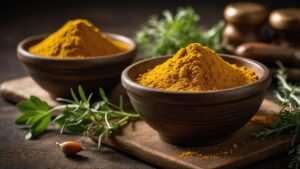
Anxiety is something I’ve encountered numerous times, both in my own life and through stories shared by friends and family. It can feel all-encompassing and, often, overwhelming. This led me on a quest: Could something as ancient as Ashwagandha, a staple of Ayurvedic medicine, offer relief from anxiety in ways that modern pharmaceuticals can’t? With modern medicine offering quick fixes, I often wonder if we are overlooking nature’s wisdom. The use of herbs like Ashwagandha seems to be making a comeback, but how does it stack up against the science-backed approaches of today’s medical world?
For centuries, people have turned to plants for healing. I remember a conversation with my grandfather, who grew up in India, about how his mother would brew herbal teas when he was stressed or anxious. He specifically mentioned Ashwagandha, a root that has been used in traditional medicine for thousands of years. He said it always seemed to calm him, even when modern medicine wasn’t available. This piqued my curiosity. Could natural herbs provide an alternative or even complement modern treatment options for anxiety?
But, here’s where I stand: I’m not someone who will quickly throw away the benefits of modern science. I appreciate the advancements, and I know many people who have found relief through medication. However, I believe in balance, and I’ve come to realize that natural herbs, like Ashwagandha, may have more to offer than we give them credit for.
Ashwagandha for Anxiety Relief: Ancient Wisdom Meets Modern Science
Ashwagandha’s Effects on Cortisol Levels
Ashwagandha has been shown to lower cortisol levels, the stress hormone that can fuel anxiety. When you’re stressed, your body is in a heightened state of alert. While modern medicine often uses beta-blockers or benzodiazepines to calm this response, Ashwagandha works by naturally lowering cortisol levels. One study found that those taking Ashwagandha had a significant reduction in their stress and anxiety levels.
I’ve personally tried Ashwagandha when I went through a particularly stressful phase of my career. There was something soothing about the routine of taking it—an herbal, earthy blend that connected me to nature. While I didn’t expect a miracle, I did notice that I felt less reactive to stress. It wasn’t immediate, but after a few weeks, I felt more balanced. I had fewer sleepless nights, and my racing thoughts began to calm.
How Does Modern Medicine Compare?
Modern medicine can be incredibly effective for anxiety. Many people I know rely on SSRIs or anti-anxiety medications like Xanax to manage their symptoms. These medications act quickly and often provide relief when anxiety becomes too overwhelming to manage naturally. But I’ve also seen the side effects: drowsiness, dependency, and sometimes even a blunting of emotions.
Ashwagandha, on the other hand, doesn’t work as quickly. If you’re in the throes of a panic attack, it’s not going to be your rescue remedy. But what it does do is help to build resilience over time. Modern medicine tends to treat symptoms, whereas Ashwagandha seems to address the root of stress—cortisol imbalance. For someone looking for a more holistic, long-term approach, I believe Ashwagandha has its place.
Natural Remedies vs. Prescription Medications: Which Is More Effective?
A Long-Term Approach with Fewer Side Effects
When I think about long-term management, the idea of taking prescription medication every day can feel daunting. Some people do it successfully, but there’s always the question of dependency and side effects. A friend of mine once told me how difficult it was to stop taking anti-anxiety medication, as the withdrawal symptoms left her more anxious than before. In contrast, Ashwagandha is less likely to cause dependency or harsh side effects.
When Prescription Medications are Necessary
That being said, there are times when modern medicine is essential. A close family member of mine struggled with debilitating anxiety after a traumatic event. In this case, the immediate relief from a prescription medication was critical. It gave her the ability to function, to get through the day without overwhelming fear and panic. But once she stabilized, she turned to more natural solutions like Ashwagandha to maintain balance, and it has worked for her.
The Role of Adaptogens
Ashwagandha is part of a group of herbs known as adaptogens. Adaptogens help the body adapt to stress, which can be incredibly useful in our fast-paced world. One of the things I like about Ashwagandha is that it works with your body to regulate stress responses, rather than shutting them down. Modern medicine often seeks to “turn off” certain stress signals, but adaptogens like Ashwagandha aim to create harmony in the body’s natural processes.
How to Incorporate Ashwagandha into Your Routine for Anxiety Relief
Dosing and Forms
Ashwagandha is available in various forms: powders, capsules, tinctures, and even teas. Personally, I prefer the capsule form, simply because it’s convenient, but I’ve heard others swear by the powder in a morning smoothie. If you’re new to Ashwagandha, starting with 300-500 mg per day is typically recommended. Most research suggests that it can take a few weeks to start feeling the effects.
Combining Ashwagandha with Modern Therapy
One of the best approaches I’ve seen is combining Ashwagandha with modern treatments like therapy. Cognitive-behavioral therapy (CBT) is highly effective for anxiety, and when paired with a natural remedy like Ashwagandha, it can provide both immediate tools to handle anxiety and long-term resilience against stress. I believe that Ashwagandha complements therapy by helping your body cope while your mind works through the psychological aspects of anxiety.
Finding What Works for You
At the end of the day, it’s all about finding what works for you. I don’t believe in a one-size-fits-all approach to anxiety. Some people will benefit from medication, while others may find relief in nature’s offerings. I like the idea of keeping an open mind and exploring different options, from traditional herbal remedies to modern medical advancements.
Conclusion: Is Ashwagandha the Answer for Anxiety?
Ashwagandha may not be a quick fix, but for those looking for a natural, long-term solution to anxiety, it offers a promising option. The way it works to lower cortisol levels and help the body adapt to stress makes it unique compared to traditional prescription medications. While I think modern medicine is crucial in severe cases, Ashwagandha is a gentle way to help the body build resilience over time. In my opinion, it’s worth trying, especially for those who want to manage anxiety without the side effects of pharmaceuticals. With the right combination of tools, including therapy, lifestyle changes, and natural herbs, finding balance in a stressful world feels a bit more achievable.









